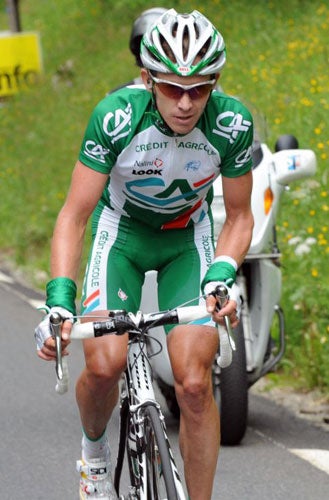Tour de France: Fourth positive test reported on last day

Your support helps us to tell the story
From reproductive rights to climate change to Big Tech, The Independent is on the ground when the story is developing. Whether it's investigating the financials of Elon Musk's pro-Trump PAC or producing our latest documentary, 'The A Word', which shines a light on the American women fighting for reproductive rights, we know how important it is to parse out the facts from the messaging.
At such a critical moment in US history, we need reporters on the ground. Your donation allows us to keep sending journalists to speak to both sides of the story.
The Independent is trusted by Americans across the entire political spectrum. And unlike many other quality news outlets, we choose not to lock Americans out of our reporting and analysis with paywalls. We believe quality journalism should be available to everyone, paid for by those who can afford it.
Your support makes all the difference.Ten years after the Festina scandals rocked the Tour de France, the sport's battle against doping is inching forward – but very slowly and last night with a fresh lurch into reverse gear.
Even as Carlos Sastre was celebrating his victory, news broke that yet another rider – the fourth in this year's race – had failed a drugs test. The French anti-doping authorities said Dimitry Fofonov, a Kazakh with the Crédit Agricole team who was lying 19th overall in Paris, had tested positive for the banned stimulant heptaminol.
Fofonov is hardly a huge name in the sport, with just three victories, none of them major, in a career spanning a decade. His team instantly sacked the rider, and their manager, Roger Legeay, reported Fofonov had "said he bought something on the internet. It was a serious offence."
After 10 days with no drugs scandals, Fofonov's failed test was a grim reminder that, for all the statements of good intentions, doping is far from being rooted out. Even in the earliest Tours, commonplace drugs like strychnine, laudanum, strong alcohols and coffee were used by individuals to combat the pain.
But in 1998 a Belgian police seizure of a team helper's car chock-a-block with banned drugs revealed that illegal substances in cycling had become big business indeed.
Festina, the team at the centre of the scandal, were kicked out, several teams, mostly Spanish, quit in protest at the ensuing police investigation and just 96 riders made it to Paris.
Since then almost every July a scandal, or potential scandal, has emerged. In 1999 Lance Armstrong faced allegations of excessive corticoid use, categorically denied by the seven-times Tour winner, against whom no wrongdoing has ever been proved. In 2000 three riders were not allowed to start because of suspect blood values. In 2001 the Spaniard Txema del Olmo tested positive for EPO. In 2002, third-placed Raimondas Rumsas's wife was stopped with a carload of drugs – and in 2005, the Italian rider Dario Frigo's partner was discovered driving a vehicle with illegal medicines.
In 2006, the Tour winner Floyd Landis was stripped of his title after testing positive for artificial testosterone. Two teams, Astana and Cofidis, also quit after riders failed drugs tests.
Reinforced testing this year – two and half weeks in, 175 urine and 48 blood tests, as well as 15 tests on hair samples had been carried out – produced four positive tests. "Whoever wins the Tour should be given a certificate saying 'genuine'. There's been too much testing for it to be otherwise," one sports director said.
As usual it is the anti-doping labs who will have the last word on that. And Fofonov's positive was hardly an encouraging send-off for the Tour.
Join our commenting forum
Join thought-provoking conversations, follow other Independent readers and see their replies
Comments